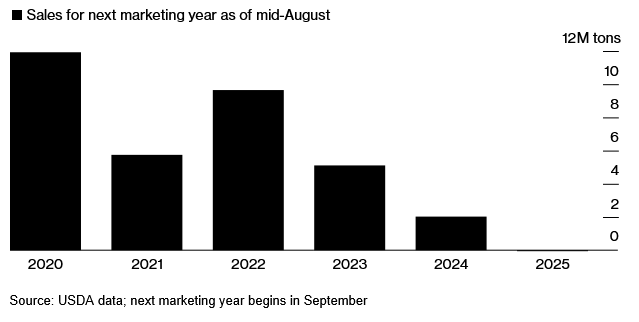China has not purchased a single batch of US soybeans ahead of export season

Just days before the start of the U.S. soybean export season, the world’s largest importer, China, appears to have purchased no U.S. soybean batches for the upcoming marketing year.
The deadlock between China and the U.S., long the second-largest supplier to China, has emerged amid negotiations between the two governments to end a trade war that has complicated trade since Donald Trump’s return to the presidency. U.S. farmers warn that this impasse threatens them with financial ruin, but U.S. government data suggests Chinese buyers remain calm.
In March, China imposed retaliatory tariffs on U.S. soybeans, reducing their competitiveness. The U.S. harvest typically begins in September, marking the transition from one export season to the next. Chinese oilseed processing plants, which produce animal feed, usually book orders in advance to secure lower prices and meet their needs for the first weeks or months of the agricultural year.

China Has Not Increased Soybean Purchases from the US
Data from the U.S. Department of Agriculture shows no deliveries to China for the 2025–2026 period.
This delay appears tied to trade negotiations extended until November 10, as Beijing is unwilling to concede a key bargaining chip. While Chinese commodity purchases are just one aspect of the talks, soybeans played a significant role during Trump’s first administration in addressing what the U.S. called an unfair trade deficit with China.
The soybean market is highly seasonal: U.S. supplies dominate until the Southern Hemisphere harvest, particularly from China’s leading supplier, Brazil, begins in February. This could theoretically lead to a supply shortage until the next wave of Brazilian soybeans arrives.
There is hope that normal trade will resume once Washington and Beijing reach a mutually beneficial agreement. However, if this proves challenging, traders and analysts agree that Brazil likely has enough old-crop stocks—around 37 mln tons (22% of last season’s harvest) as of August 5, per Safras & Mercado—to cover any shortfall, while China can tap its substantial reserves.
Over the past few months, Chinese processing plants have procured significant amounts of Brazilian soybeans, with over 30 mln tons expected to arrive in the next three months, according to Chinese consultancy Mysteel. Over the past decade, China has imported between 90 and 105 mln tons annually.
Alternative Levers
If China avoids U.S. soybeans, it can source them only from Brazil or Argentina, said a manager at a major Chinese processing plant, speaking anonymously as he is not authorized to speak to the media. He added that his facility is prepared for South American supplies until November.
However, bypassing the U.S. carries risks. “Brazil can meet most of its needs, but seasonality makes relying solely on South America risky,” said Kan Wei Chen, an agricultural broker at StoneX Group Inc. in Singapore. “That’s why, despite political tensions, China typically returns to U.S. soybeans when Brazil’s supply window narrows.”
Chinese processors will almost certainly face higher costs. Brazilian soybeans have risen nearly 20% in price since the start of the year and trade at a significant premium over U.S. competitors.
China’s other levers include further diversifying supply or reducing direct demand. To this end, trial shipments of soybean meal from Argentina are underway, while Beijing continues to push for reduced soybean meal use in livestock feed and limits on its massive pig herd.
China is sending a key representative to trade talks in the U.S., signaling progress after President Trump extended a tariff truce earlier this month.
For almost 30 years of expertise in the agri markets, UkrAgroConsult has accumulated an extensive database, which became the basis of the platform AgriSupp.
It is a multi-functional online platform with market intelligence for grains and oilseeds that enables to get access to daily operational information on the Black Sea & Danube markets, analytical reports, historical data.
You are welcome to get a 7-day free demo access!!!
Read also
AmSpec – Partner of BLACK SEA GRAIN.KYIV-2026
Romania Emerges as a Strategic Pillar in the EU Rapeseed Supply Shift
Africa’s interest in agro-processing creates an opportunity for Ukraine to develop...
High soybean yields in Brazil pose challenges for the US market
Pakistan faces potential wheat shortage amid war and drought
Write to us
Our manager will contact you soon



